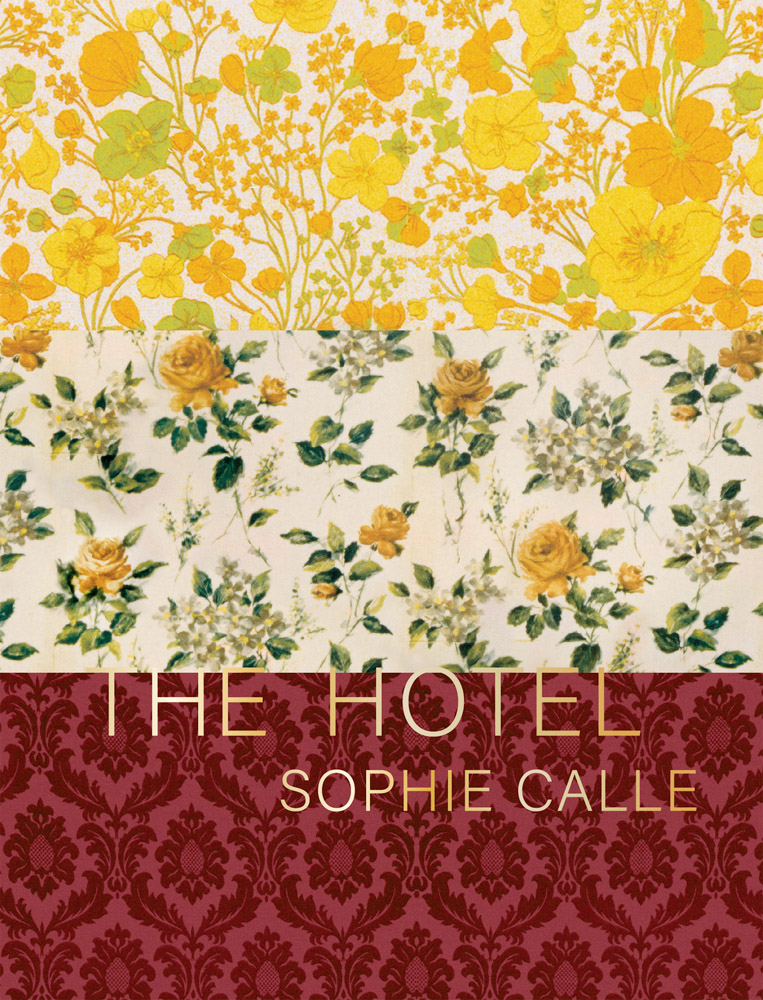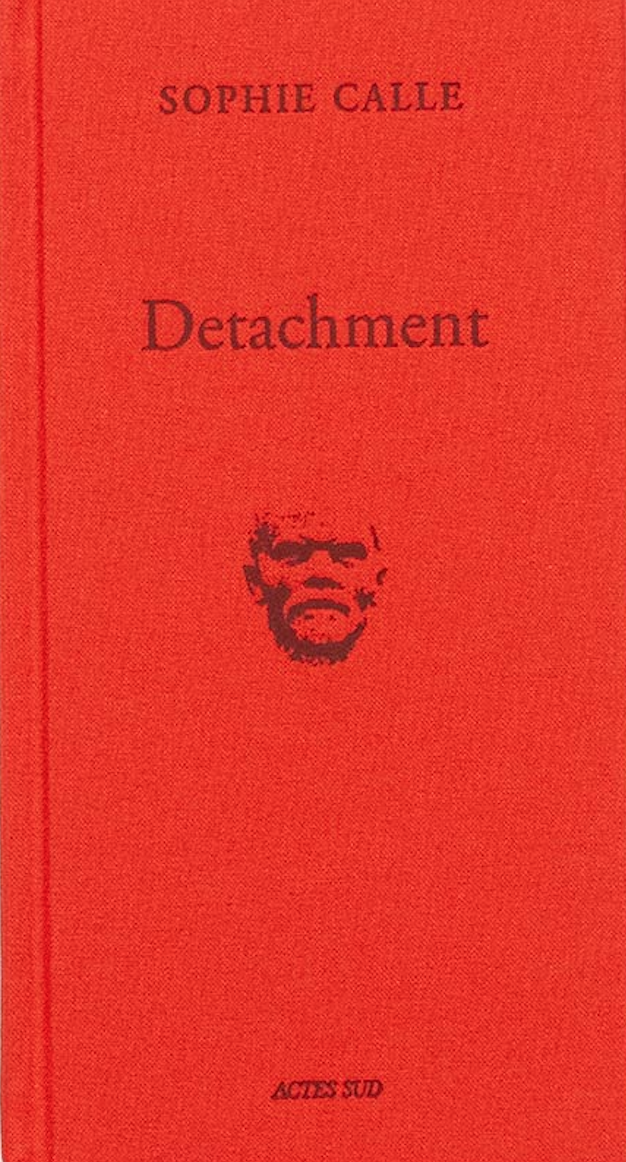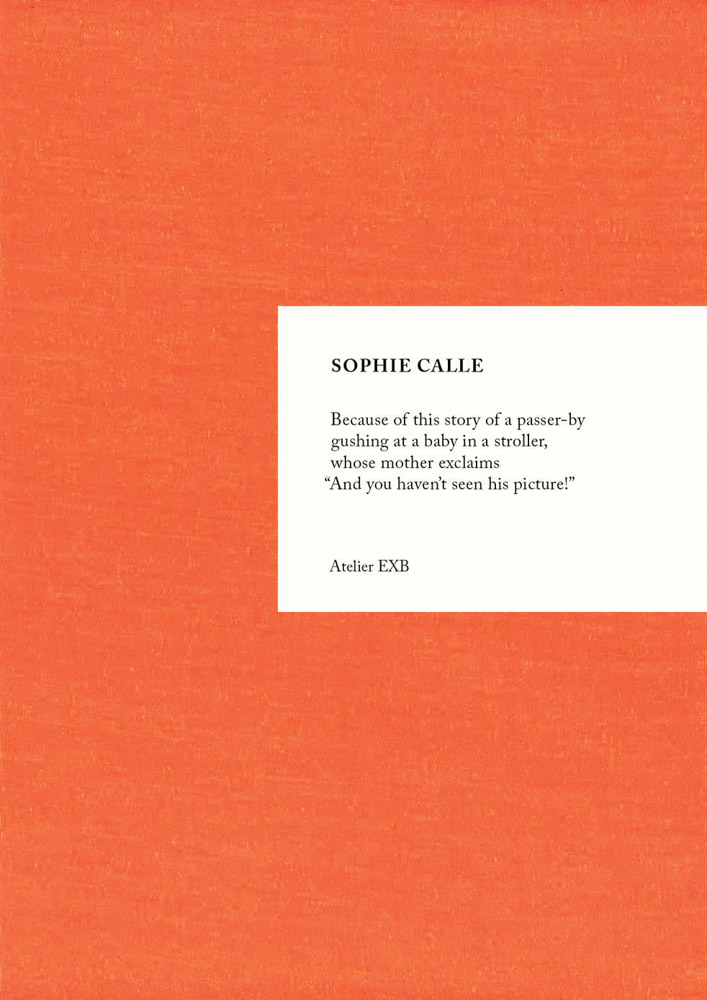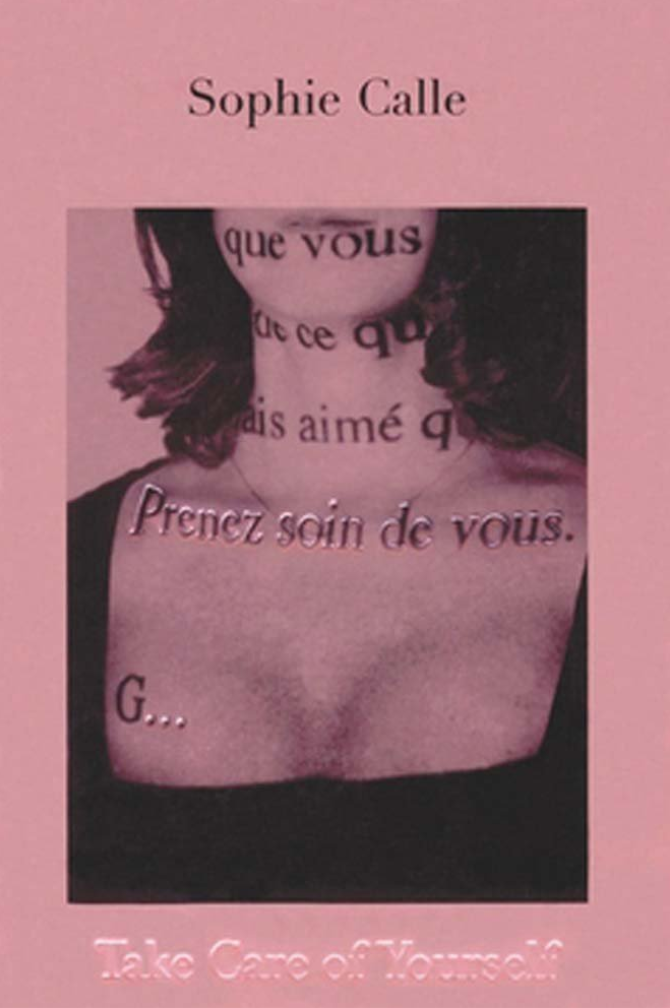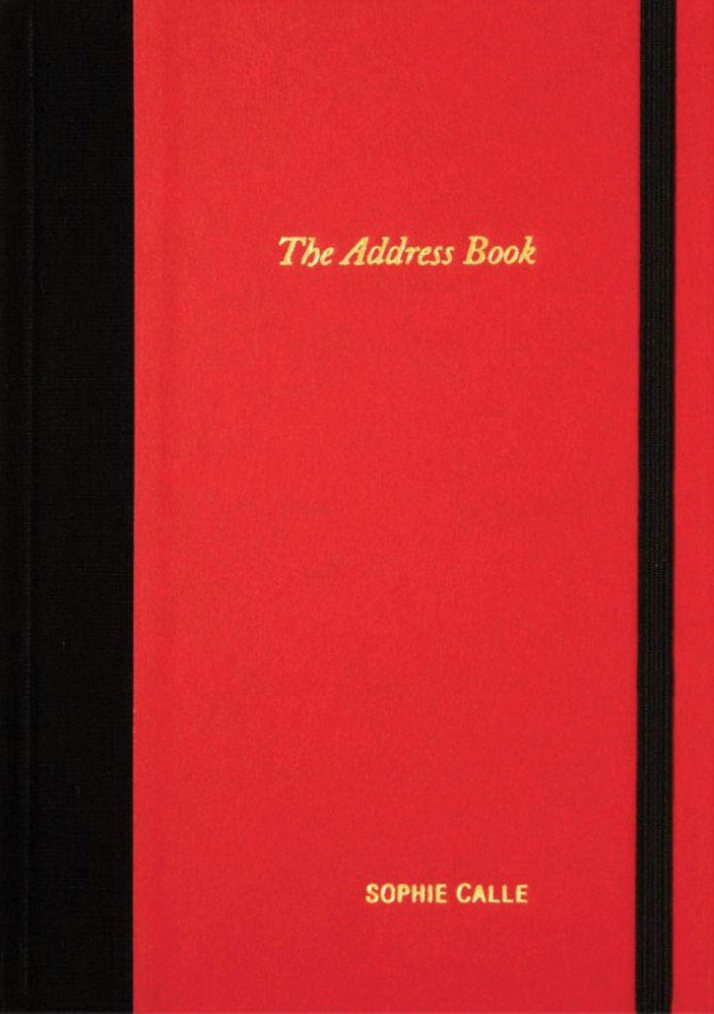Sophie Calle Because
A stunning artist’s book containing loose photographs hidden between pages of text that tell the story of each image
Words have always been central to the practice of French artist Sophie Calle (born 1953), who is known for her photographic work that often includes panels of text of her own writing. In this project, Calle conceives of the internal thought processes behind her art-making as stories to be told. It is with these stories—alongside the external stories of the moments preceding a click of a camera shutter—that Calle opens Because. The volume chronicles her reasons behind capturing particular moments in time, but the corresponding photos themselves are revealed only later, hidden in the interstices of the Japanese binding. In this process, Calle reverses the relationship of natural primacy between an image and the words that accompany it, instead calling our attention to the influence that the latter may have on our perception of a photograph.
The new revised edition of this classic artist’s book contains 39 loose photographs inserted between the pages, alongside text and other imagery by Calle. A beautiful object in its own right, it features Japanese binding and an iridescent orange cloth cover.
Atelier Exb, 2024 | Hardcover | 6.75 x 9.5 in. | 168 pgs | 39 color.
| 9782365114097

Sophie Calle:
The Sleepers
Calle’s seminal 1979 series of people sleeping in her bed: now in English
In one of Sophie Calle’s first artistic experiments, she invited friends, acquaintances and strangers to sleep in her bed. Twenty-seven people agreed, among them a baker, a babysitter, an actor, a journalist, a seamstress, a trumpet player and three painters. Calle photographed them awake and asleep, secretly recording any private conversations once the door closed. She served each a meal, and, if they agreed, she subjected them to a questionnaire that probed their personal predilections, habits and dreams as well as their interpretations of the act of sleeping in her bed: a curiosity, a game, an artwork, or—as Calle intended it—a job. The result, comprising her first exhibition in 1979, was a grid of 198 photographs and short texts.
Unlike the original installation, this artist’s book version of The Sleepers contains not only all the photographs and captions but also her engrossing, novellalike narrative, untranslated until now. From the single, liminal mise-en-scène of her bedroom, Calle reports in text and photos, as if in real time, as sleepers arrive, talk, sleep, eat and leave. Their acute and sometimes startling, sometimes endearing particularities merge into something almost like an eight-day-long dream. Many seeds of Calle’s subsequent works are embedded in The Sleepers: her exacting and transgressive methods of investigation, her cultivation of intimacy and remove, and her unrelenting curiosity. In this work, as she observes the sleepers, they observe her too—with reciprocal candor. The Sleepers, clothbound and pillow-like, unfolds as it opens, inviting the reader to join the others in Calle’s bed.
Siglio, 2024 | Clth, 6 x 8 in. | 304 pgs | 176 bw. | 9781938221347
$48.00
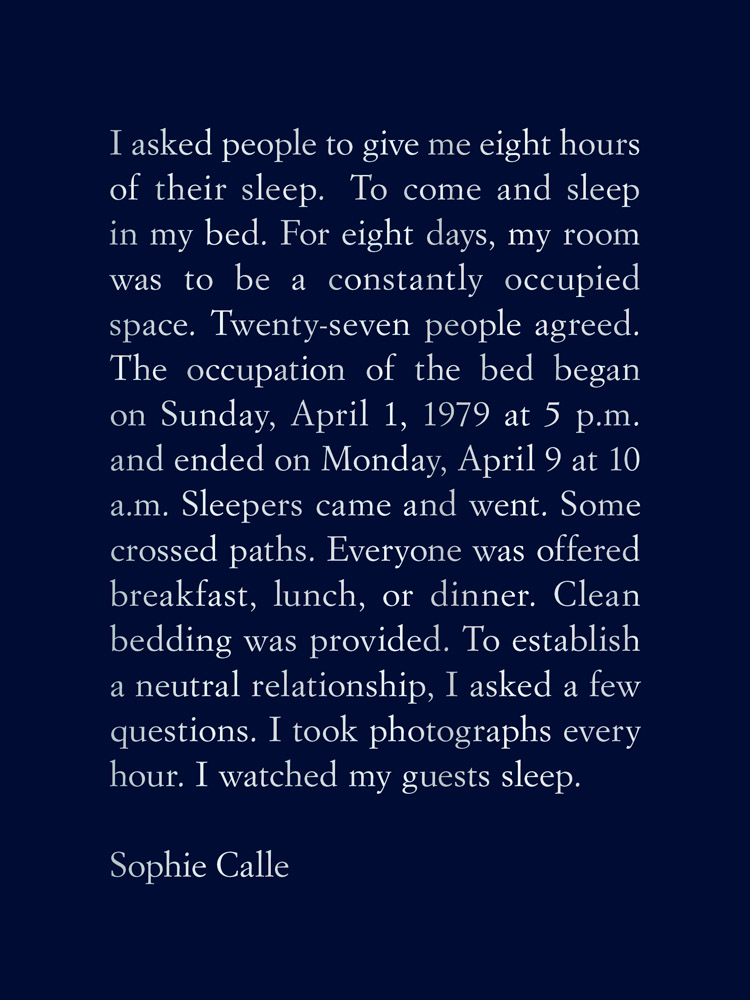
Sophie Calle: Suite Venitienne
Calle’s first artist’s book documents her pursuit of one man through the streets of Venice
After following strangers on the streets in Paris for months, photographing them and notating their movements, Sophie Calle ran into a man at an opening whom she had followed earlier that day. "During the course of our conversation, he told me he was planning an imminent trip to Venice. I decided to follow him," she writes at the beginning of Suite Vénitienne, her first artist's book and the crucible of her inimitable fusion of investigatory methods, fictional constructs, the plundering of real life and the composition of self. Over the course of almost two weeks in Venice, Calle notates, in time-stamped entries, her surveillance of Henri B., as well as her own emotions as she seeks, finds and follows him through the labyrinthine streets of Venice.
Her investigation is both methodical (calling every hotel, visiting the police station) and arbitrary (sometimes following a stranger—a flower delivery boy, for instance—hoping someone might lead her to him). This Siglio reissue is a completely new iteration of Suite Vénitienne (first published in 1988 and long out of print), designed in collaboration with Calle to be the definitive English-language edition. Printed on Japanese paper with a die-cut cover and gilded edges, this beautiful new Siglio edition allows readers to devour this crucial and compelling work.
Siglio, 2015 | Hardcover | 96 pages | 5.5 x 8 in | 4 color | 56 bw. |
| 9781938221095 |
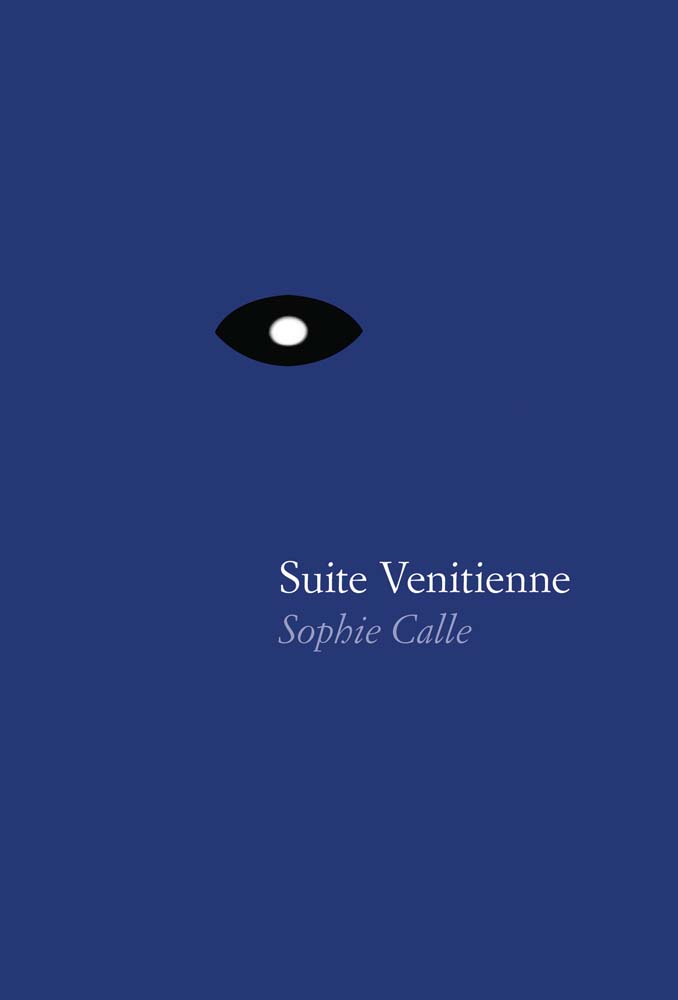
Sophie Calle:
The Hotel
In 1981 Sophie Calle took a job as a chambermaid for the Hotel C in Venice, Italy. Stashing her camera and tape recorder in her mop bucket, she not only cleans and tidies, but sorts through the evidence of the hotel guests' lives. Assigned 12 rooms on the fourth floor, she surveys the state of the guests' bedding, their books, newspapers and postcards, perfumes and cologne, traveling clothes and costumes for Carnival. She methodically photographs the contents of closets and suitcases, examining the detritus in the rubbish bin and the toiletries arranged on the washbasin. She discovers their birth dates and blood types, diary entries, letters from and photographs of lovers and family. She eavesdrops on arguments and love-making. She retrieves a pair of shoes from the wastebasket and takes two chocolates from a neglected box of sweets, while leaving behind stashes of money, pills and jewelry. Her thievery is the eye of the camera, observing the details that were not meant for her, or us, to see.
The Hotel now manifests as a book for the first time in English (it was previously included in the book Double Game). Collaborating with the artist on a new design that features enhanced and larger photographs, and pays specific attention to the beauty of the book as an object, Siglio is releasing its third book authored by Calle, after The Address Book (2012) and Suite Vénitienne (2015).
Siglio, 2021 | Clth | 6 x 8 in. | 224 pgs | 12 color | 180 bw.
